The Science of Coffee
The Science of Coffee is a journey into coffee’s hidden microscopic secrets to help you make even better coffee at home. Documentary maker and coffee professional James Harper travels the world and speaks with leading coffee scientists to help you appreciate coffee more deeply. You are going to get taken into the science of water, coffee extraction, plant genetics, espresso technology, latte foam, sonic seasoning, our sense of taste and smell, organic farming, roasting, grinding and freshness, and how to think like a scientist. Press the Subscribe button so you don’t miss future episodes! The Science of Coffee is a spin-off series from James Harper’s documentary podcast Filter Stories. Follow James on Instagram: https://bit.ly/2Mlkk0O Listen to Filter Stories: https://bit.ly/3ajoT5
Episodes
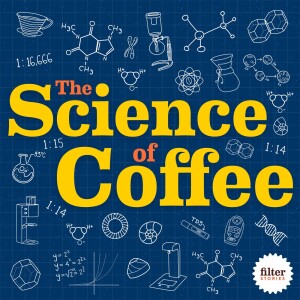
Monday Jul 14, 2025
Monday Jul 14, 2025
Water massively impacts your coffee’s flavours. But most of us struggle to fix our water because water science is confusing…
…until now! In this special collaboration with Lucia Solis (Making Coffee podcast), I guide her through the two most important concepts you need to understand to get great-tasting water for coffee: hardness and alkalinity.
We go step-by-step through:
• Why these concepts matter for coffee flavour and equipment
• How to test your water at home
• How to fix it, depending on what you’re working with
These aren’t one of my usual narrative episodes—they’re a straightforward, practical guide to help you take control of your water.
By the end of these episodes, you’ll be able to say: “I know what good water for coffee is and how to get it”.
I hope it helps you as much as it helped Lucia.
Check my website for all the visuals mentioned in this episode, including:
SCA graph for excellent water (the “map”)
Map of different water hardness across Paris
My Berlin water report
The nightmarish table of conversions…
Results from my water tests in my Berlin studio
Bottled water brands rated for their hardness and alkalinity
Please spread the word about The Science of Coffee!Leave a 5 star rating on SpotifyFollow me on Instagram and tag me in an Instagram storyWrite a review on Apple Podcasts
Discover how I make these Filter Stories episodes by subscribing to my Substack newsletter
Resources mentioned in the episode:
SCA’s Water Quality Handbook
Hardness and alkalinity dripper testing kit (also good for keeping your fishies happy)
BWT Penguin Filter Jug (what I used to use with the magnesium cartridges)
BWT BestAqua ROC (what now I use)
BWT BestBarista (for cafes)
Create your own water by adding minerals to very soft or distilled water: JoJo Hersh’s simple calculator using epsom salts and bicarbonate of soda, and Barista Hustle’s more elaborate one.
Want to go deeper into water chemistry?
BWT White Paper on the effects of magnesium (German)Christopher Hendon’s book Water for CoffeeDo an online Certificate of Advanced Studies at the Coffee Excellence Centre
Read The Craft and Science of CoffeeBarista Hustle's Water courseSome water content on YouTube by James Hoffman and Lance Hedrick
Season 3 of The Science of Coffee is made possible by these leading coffee organisations:
The Coffee Quest | BWT | TODDY | Algrano | Probat

Monday Jul 14, 2025
Monday Jul 14, 2025
Water massively impacts your coffee’s flavours. But most of us struggle to fix our water because water science is confusing…
…until now! In this special collaboration with Lucia Solis (Making Coffee podcast), I guide her through the two most important concepts you need to understand to get great-tasting water for coffee: hardness and alkalinity.
We go step-by-step through:
• Why these concepts matter for coffee flavour and equipment
• How to test your water at home
• How to fix it, depending on what you’re working with
These aren’t one of my usual narrative episodes—they’re a straightforward, practical guide to help you take control of your water.
By the end of these episodes, you’ll be able to say: “I know what good water for coffee is and how to get it”.
I hope it helps you as much as it helped Lucia.
Check my website for all the visuals mentioned in this episode, including:
SCA graph for excellent water (the “map”)
Map of different water hardness across Paris
My Berlin water report
The nightmarish table of conversions…
Results from my water tests in my Berlin studio
Bottled water brands rated for their hardness and alkalinity
Please spread the word about The Science of Coffee!Leave a 5 star rating on SpotifyFollow me on Instagram and tag me in an Instagram storyWrite a review on Apple Podcasts
Discover how I make these Filter Stories episodes by subscribing to my Substack newsletter
Resources mentioned in the episode:
SCA’s Water Quality Handbook
Hardness and alkalinity dripper testing kit (also good for keeping your fishies happy)
BWT Penguin Filter Jug (what I used to use with the magnesium cartridges)
BWT BestAqua ROC (what now I use)
BWT BestBarista (for cafes)
Create your own water by adding minerals to very soft or distilled water: JoJo Hersh’s simple calculator using epsom salts and bicarbonate of soda, and Barista Hustle’s more elaborate one.
Want to go deeper into water chemistry?
BWT White Paper on the effects of magnesium (German)Christopher Hendon’s book Water for CoffeeDo an online Certificate of Advanced Studies at the Coffee Excellence Centre
Read The Craft and Science of CoffeeBarista Hustle's Water courseSome water content on YouTube by James Hoffman and Lance Hedrick
Season 3 of The Science of Coffee is made possible by these leading coffee organisations:
The Coffee Quest | BWT | TODDY | Algrano | Probat

Monday Jun 23, 2025
Monday Jun 23, 2025
Every time we open a bag of beautiful specialty coffee — like Erick Bravo’s from Finca El Chaferote in Huila, Colombia — we’re drinking something that’s been on a long journey.
And I mean long! Over 1500 kilometers north up and down the Andes mountain range, a distance more than twice the height of France.
Along the way, it passes through dozens of hands, machines, and decisions. We follow it through muddy mountain sides, dusty dry mills, and hurricane-battered coastal warehouses — places where all kinds of things can go wrong. A leaky roof. An overly aggressive polishing machine. Or even theft.
But here’s the mystery: getting Erick’s coffee to port costs 50% more than sending a commodity coffee through the same route.
Why?
That question led me deep into Colombia’s coffee supply chains — and what I found changed how I think about the real cost of treating coffee with care.
Please spread the word about The Science of Coffee!Leave a 5 star rating on SpotifyFollow me on Instagram and tag me in an Instagram storyWrite a review on Apple Podcasts
Discover how I make these Filter Stories episodes by subscribing to my Substack newsletter
Find your next favourite Colombian coffee from The Coffee Quest
Taste coffees from Erick Bravo’s award winning farm, Finca El Chaferote, and follow him on Instagram.
Season 3 of The Science of Coffee is made possible by these leading coffee organizations:
The Coffee Quest | BWT | TODDY | Algrano | Probat
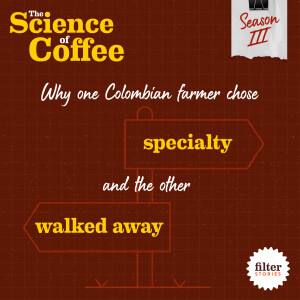
Monday Jun 09, 2025
Monday Jun 09, 2025
I travel to Colombia’s Huila region to answer a question that’s puzzled me for years: if specialty coffee pays more, is better for the environment, and brews tastier cups—why don’t more farmers grow it?
I speak with two producers in the same region whose choices couldn’t be more different. One stakes his future on specialty. The other opts out.
Their decisions come down to more than passion or a hard work ethic. Instead, I uncover two starting conditions—often invisible to us buyers—that strongly shape whether a farmer chooses specialty at all.
If we want to see more speciality coffee grown, we need to bring down the barriers to specialty. But first we need to understand what those barriers really are.
The answers might surprise you. They surprised me.
Please spread the word about The Science of Coffee!Leave a 5 star rating on SpotifyFollow me on Instagram and tag me in an Instagram storyWrite a review on Apple Podcasts
Discover how I make these Filter Stories episodes by subscribing to my Substack newsletter
Find your next favourite Colombian coffee from The Coffee Quest
Taste coffees from Erick Bravo’s award winning farm, Finca El Chaferote
Nerd out on my farm profitability estimations
Season 3 of The Science of Coffee is made possible by these leading coffee organizations:
The Coffee Quest | BWT | TODDY | Algrano | Probat
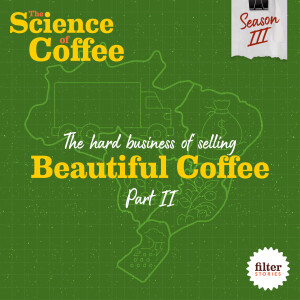
Monday May 19, 2025
Monday May 19, 2025
Volume. Cheap. Lame flavours. This is the traditional way of growing coffee in Brazil, and almost every farm does it this way.
But what if you wanted to produce beautiful, distinctive flavours instead—and make a living from it?
In this episode, we travel to Fazenda Paraíso in Minas Gerais, Brazil, where farmer Vicente Pereira and his daughter are on a steep learning curve finding buyers for their beautiful coffees.
Part 2 explores what it looks like for a small Brazilian farm to find better buyers, and the challenge of achieving pricing power.
Behind every beautiful coffee is a family story like this, but it’s a story we rarely get to see close up.
Let’s take a closer look.
Please spread the word about The Science of Coffee!Leave a 5 star rating on SpotifyFollow me on Instagram and tag me in an Instagram storyWrite a review on Apple Podcasts
Discover how I make these Filter Stories episodes by subscribing to my Substack newsletter
Source your next lot of specialty green coffee on Algrano
Listen to Firefly to hear a cautionary tale about a specialty farm failing because they couldn't find the right buyers.
Try Fazenda Paraiso's and Sancoffee's coffees for yourself!
Season 3 of The Science of Coffee is made possible by these leading coffee organizations:
The Coffee Quest | BWT | TODDY | Algrano | Probat
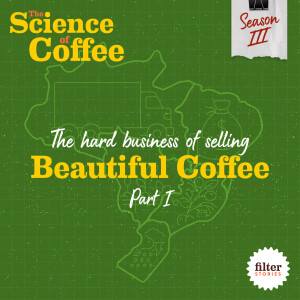
Monday May 19, 2025
Monday May 19, 2025
Volume. Cheap. Lame flavours. This is the traditional way of growing coffee in Brazil, and almost every farm does it this way.
But what if you wanted to produce beautiful, distinctive flavours instead—and make a living from it?
In this episode, we travel to Fazenda Paraíso in Minas Gerais, Brazil, where farmer Vicente Pereira and his daughter are on a steep learning curve finding buyers for their beautiful coffees.
Part 1 unravels the hidden structures of Brazil’s coffee industry: how prices are set, why it’s so hard to create a specialty-focused farm, and why Vicente's farm is unsustainable if he sells his coffee the traditional way.
Behind every beautiful coffee is a family story like this, but it’s a story we rarely get to see close up.
Let’s take a closer look.
Please spread the word about The Science of Coffee!Leave a 5 star rating on SpotifyFollow me on Instagram and tag me in an Instagram storyWrite a review on Apple Podcasts
Discover how I make these Filter Stories episodes by subscribing to my Substack newsletter
Source your next lot of specialty green coffee on Algrano
Listen to Firefly to hear a cautionary tale about a specialty farm failing because they couldn't find the right buyers.
Try Fazenda Paraiso's and Sancoffee's coffees for yourself!
Season 3 of The Science of Coffee is made possible by these leading coffee organizations:
The Coffee Quest | BWT | TODDY | Algrano | Probat
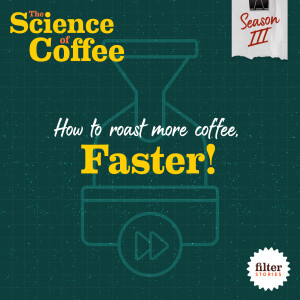
Monday Mar 24, 2025
Monday Mar 24, 2025
To roast coffee faster, you need to turn up the heat….right?
No!
In this episode, we explore the three powerful methods of heat transfer that revolutionised roasting. We’ll journey from humble beginnings—when roasting three kilos took half an hour—to machines that now roast hundreds of kilos of coffee in the time it takes you to boil a kettle.
But beans roasted at lightning speed look strange, and taste… well, you’ll find out. Join us as we test-drive an industrial tangential roaster where first crack remind me of fireworks crackers.
We also see the whale-sized roaster so massive it’s worth you a Guinness World Record.
We have the technology today to roast coffee faster than ever, so why aren’t we all roasting at recording-breaking speeds?
---------------
Please spread the word about The Science of Coffee!Leave a 5 star rating on SpotifyFollow me on Instagram and tag me in an Instagram storyWrite a review on Apple Podcasts
Discover how I make these Filter Stories episodes by subscribing to my Substack newsletter
Check out the Probat roasters mentioned in this episode:
Emmerich Spherical Roaster - "Pink Hydrant"
Large ball roaster - “Sputnik in a pizza oven”
G45 early drum roaster - “Old school steam train”
Early tangential roaster
Sample tangential roaster - "Shoebox"
Neptune 4000, the largest drum roaster in the world! - "The whale"
And there are lots of other specialty roasters from Probat I didn't have time to showcase, including their new hydrogen powered roasters. See them all for yourself!.
Theodor von Gimborn's wikipedia page
Go deeper into the science of roasting
Read Mark Al-Shemmeri’s coffee roasting blog
Do a Certificate of Advanced Studies with the Coffee Excellence Centre
Explore Barista Hustle's online roasting learning
Learn more from Morten Münchow and his coffee roasting courses
Read Morten’s paper in collaboration with the University of Copenhagen on Roasting Conditions and Coffee Flavour
Follow Filter Stories on Instagram for my infographics
Learn more about first crack on my episode Coffee Roasting, Part 1: How heat transforms coffee beans
Season 3 is made possible by these leading coffee organizations:
The Coffee Quest | BWT | TODDY | Algrano | Probat
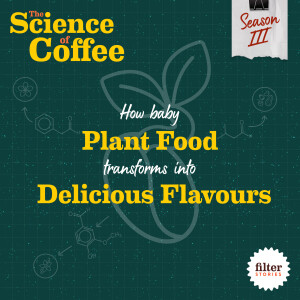
Monday Mar 10, 2025
Monday Mar 10, 2025
A mother coffee plant gifts its baby everything it needs to grow—a green seed packed with food. But when we roast coffee, we hijack that gift and turn it into something else: flavor.
But what is flavor, at a microscopic level? What actually happens inside the bean when heat meets those nutrients?
In this episode, we shrink down to witness the Maillard reaction up close—a wild chain of molecular collisions that transforms baby plant food into aromas we adore.
Grab your popcorn - you’re getting a front row seat at the wildest chemistry show in coffee.
---------------
Please spread the word about The Science of Coffee!Leave a 5 star rating on SpotifyFollow me on Instagram and tag me in an Instagram storyWrite a review on Apple Podcasts
Discover how I make these Filter Stories episodes by subscribing to my Substack newsletter
Ethiopian forest sounds curtesy of George Vlad. Hear more nature sounds here.Explore Probat's roasters
Go deeper into the science of roasting
Do a Certificate of Advanced Studies with the Coffee Excellence Centre
Grab a copy of Anja Rahn's upcoming book on coffee science through her Instagram
Explore Barista Hustle's online roasting learning
Learn more from Morten Münchow and his coffee roasting courses
Read Morten’s paper in collaboration with the University of Copenhagen on Roasting Conditions and Coffee Flavour
Follow Sebastian Opitz on LinkedIn
Follow Filter Stories on Instagram for my infographics
Season 3 is made possible by these leading coffee organizations:
The Coffee Quest | BWT | TODDY | Algrano | Probat
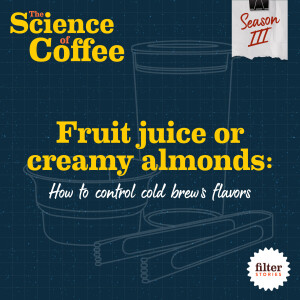
Sunday Feb 16, 2025
Sunday Feb 16, 2025
When I started making cold brew this last year, I treated it like hot brew filter coffee. But no matter how I adjusted the grind or tweaked the brew time, I hardly got any differences in flavor…
Then it hit me: cold brew isn’t just a slower hot brew—it’s a completely different game with its own rules!
In this episode, I speak with leading coffee researchers who break down the microscopic dance between water and coffee that explains why cold brew plays by its own playbook.
And I bring you in on the brewing secret that can turn your brews from fruit juice to nutty creaminess.
---------------
Please spread the word about The Science of Coffee!Leave a 5 star rating on SpotifyFollow me on Instagram and tag me in an Instagram storyWrite a review on Apple Podcasts
Discover how I make these Filter Stories episodes by subscribing to my Substack newsletterExplore TODDY’s cold brewing kits
Go deeper into the science of cold brew
Do a Certificate of Advanced Studies with the Coffee Excellence Centre
Read Jiaxin (Jessie) Liang’s equilibrium extraction SCA 25 article and her published article
Discover all of UC Davis' cold brew research through the Coffee Science Foundation
Learn how to do a cold brew cupping with Toddy
Follow Filter Stories on Instagram for my infographics
Season 3 is made possible by these leading coffee organizations:
The Coffee Quest | BWT | TODDY | Algrano | Probat
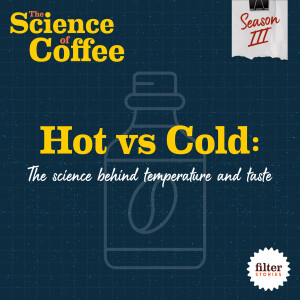
Monday Feb 03, 2025
Monday Feb 03, 2025
For years, I used cold brew as a last resort—the only brew method to tame dark, oily beans that were too bitter for hot water.
Then one day, I took a chance on a Guatemalan Gesha and brewed it cold. The result? A massive explosion of florals I’d never tasted before. That single cup sent opened my eyes into how extraordinary cold brew can be.
In this episode, I speak with world-leading coffee scientists who explain why brewing with cold water tastes so different from chilled hot coffee.
You’ll learn how certain flavors leap into your cup (and how others mysteriously vanish) when you lower the brew temperature.
You’ll also discover there are hidden “cold brew gems” in beans you thought you knew. So before you grab the kettle, consider this: sometimes all you need is cold water.
---------------
Please spread the word about The Science of Coffee!Leave a 5 star rating on SpotifyFollow me on Instagram and tag me in an Instagram storyWrite a review on Apple Podcasts
Discover how I make these Filter Stories episodes by subscribing to my Substack newsletterExplore TODDY’s cold brewing kits
Go deeper into the science of cold brew
Do a Certificate of Advanced Studies with the Coffee Excellence Centre
Listen to my episode on Coffee Extraction for insights into how polarity affects flavor extraction
Read the UC Davis cold brew vs chilled hot brew study
Listen to my episode on 'How to think like a scientist'
Learn how to do a cold brew cupping with Toddy
Follow Filter Stories on Instagram for my acidity infographic
Go deeper into Paul Breslin's work at the Monell Chemical Senses Centre
Discover all of UC Davis' cold brew research through the Coffee Science Foundation
Season 3 is made possible by these leading coffee organizations:
The Coffee Quest | BWT | TODDY | Algrano | Probat
